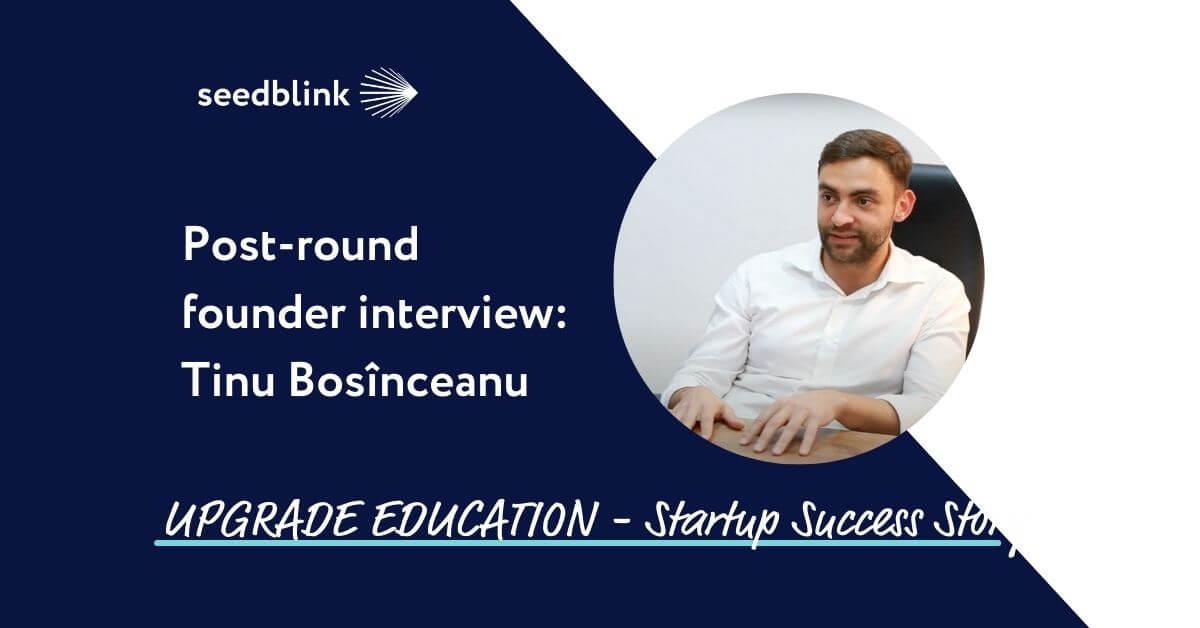SeedBlink Blog
startups And Financing
Post-round founder interview: Tinu Bosinceanu
Upgrade Education: Startup Success Story
Upgrade Education is an Edtech company founded in Bucharest, Romania, with clients around the world. The startup offers a mentoring service that provides high school students with personalized university admissions support to top universities in the US, UK, and EU.
To date, more than 500 Upgrade Academy students have found their dream university.
In September 2021, the company raised € 350,000 in a seed round from SeedBlink investors, along with Cofounder Zone (Poland), Grouport (Czech Republic), Growceanu (RO) and Angel Investors (USA), which include the co-founders of WHOOP (US unicorn company).
Tinu Bosinceanu, founder and CEO of Upgrade Education, talks to us about his experience raising capital with SeedBlink. Learn more about the Edtech company's experience raising capital with SeedBlink and the key to the success of its funding round.
Hello Tinu, it's a pleasure to connect once again. To break the ice - we noticed that you've changed your brand identity. How is Upgrade Education different from Upgrade Academy, apart from the wording?
Well, before, if you wanted to study law (for example) in the UK, you would have prepared your application with someone who had studied in the UK, but not necessarily with someone who had studied law.
Now with so many remote mentors on board, if you're applying to Cambridge Law we'll try to provide you with a mentor who has graduated from Cambridge Law, one who can help you with information about the university you want to attend, and who knows how life is like in there.
With our network of over 200 mentors, we have a mentor from almost every school we help students get into.
Also related to the rebranding: We want to be a company that focuses on changing the way education is done now – standardized and rigid – into a modular architecture in which you have an education program and mentors will help you along the way, not just in high school, but also in college or when looking for a job. In other words, we can support you from high school, all the way to the top of your career.
How did the business evolve since you accessed the seed round capital?
Upgrade has become a more structured company because investors want to see progress on a monthly basis. That has meant setting KPIs and analyzing more carefully how we can get things more structured.
In return, this helps us a lot because we feel like our partners are also our advisors, and this is the most important thing: we have where to go for a piece of advice, which super decreases the feeling that we're alone in our endeavor.
Let’s talk about investment readiness. How did you decide it was the right time to raise a round?
The right time for us was when we got enough traction.
We had been doubling our revenue consistently for the past years, so we knew that we stumbled upon a problem that was affecting the market – one that we thought we could solve well – and got proof of that.
The next step was to build even more competitive advantage because, despite solving the problem quite well, our competitive advantage was not clearly defined when compared to other providers. We decided technology would be our competitive advantage and we realized we can democratize the process by building a platform on which to enroll mentors from all over the world, instead of our “in-house” ones.
But to build such a platform we needed an investment, because technology development is expensive, as we all know, and it requires a pretty solid upfront investment before delivering a proof of concept. This is how we decided to go for the investment round.
At the time of your seed round, what other fundraising options did you consider, and why did you choose SeedBlink?
We decided to raise this round because we wanted to be able to use the money asap and also be able to collect more, down the road. For a startup to grow fast, it needs to raise money and burn it for growth.
We thought that equity investment would be the best way to go forward. We considered VCs, angel investments, and co-investment from SeedBlink, as well. We actually ended up getting them all: we got onboard angels, a crowd of investors, and VC.
How did your lead investors see this route of completing the round?
They thought it was a good idea. They were happy.
You know, we wanted more support from Romania and loved the idea of the democratic access to VC investments, and this is what SeedBlink does very well.
I think it's great to have on our side these teams providing a lot of know-how, as they can help us manage our growth. And I think it's also remarkable to gather around people who believe in our idea, including a lot of our customers, and to give them the opportunity to invest and benefit from our growth, too.
Talk us through what running a campaign was like, if you liked something in particular?
Well, it was very difficult in the beginning because it was the first time we went out with our idea to the public. And a lot of learning followed.
The thing I love most about fundraising is all the feedback that the founders get. We got great feedback initially from our close friends & family, and this perfected the pitch. And then we went to Angels, then we went to VCs.
All of them gave us so much useful feedback that, in turn, allowed us to adjust our strategy and vision. I think we made maybe like 10-15 revisions to our deck from the first iteration up to the final version that was used to raise the funds. I definitely enjoyed the feedback!
I also enjoyed the “performance” itself. It reminded me of the times when I was enrolled in mathematics competitions or, later, in interviews for top universities. It's one of those high, constructive pressure things that stimulate you greatly, and triggers an adrenaline rush. That was quite cool!
Other than that, I have to mention also meeting a lot of interesting people and extending our network. I've stayed in touch with a lot of these Angels and VCs, whether they actually invested or not. We keep in touch and we meet often to get more advice or their opinion.
Being able to connect to the EdTech ecosystem in Europe was, I think, a great benefit that came out of our fundraising process.
Looking back, is there anything you would do differently?
You can say „_I would have done things differently_”, but that's always hindsight bias. Obviously, there were mistakes that we made, that probably I could prevent now, but I don't think I could have done things much differently.
If I had to give advice to someone that's starting out, I would tell them to take the “_term sheet_” very seriously, hire lawyers, and understand very well what the term sheet means and what the investors want, exactly.
It's also important to have a sort of chemistry with your investors. You should have the same investment horizons and you should be able to work as a team.
I think most entrepreneurs would think that raising money is the most important part of the process, but as I went through it, I definitely think that finding partners who can also help you with their knowledge and directions, it's more important than the money that you raise.
How supportive was the team in helping you prepare the investment materials?
Our team was immensely supportive! They were the first line of people who saw the pitch and offered me feedback on it. Many team members took on a lot of additional responsibility because I veered into fundraising: the daily operations, implementing the strategy and maintaining the direction, a lot of these things were left to the other co-founders, and they did an amazing job.
I could not have done this without them because I was almost always in my office practicing pitching and improving the deck, for quite a long period of time.
What advice would you give to a tech entrepreneur looking to fund their growth using the power of a community of investors?
I would say it's important to look for and choose a platform that you resonate with, that shares your mission with, a platform & its people with which you feel you can have good working relationships.
For example, I worked with Eric Bartha from SeedBlink and we got an excellent relationship going forward; we talked a lot and we were in touch on a lot of matters and I think this was important. Having people who believe in your idea is of great help.
When choosing a platform, I would look at the other projects they have had. If they have had any similar ones, I would look at valuations and do a really good analysis of the previous successful campaigns, and try to see what the market appetite is, what they look for, and how it works.
I would also spend a lot of time drumming up interest before appearing on the platform. I think that's the best way. I would use the co-investment platform as a final stage, only after you've secured the lead investors. And I would also give the stakeholders dibs on the investment because they believed in the company; it's cool to give them the opportunity to invest before others. So that's basically the advice.
What are your main objectives for the current year (2022)?
We have three main objectives for the year. The first one is to double our last year revenue.
The second one is about the product: we plan to pioneer the first iteration of the whole product. Upgrade has transitioned from teaching university admissions programs to high school students, to becoming a career accelerator which help students get into university. What we want to do now is to become a marketplace for courses, helping people understand what to study. And then we will take the same structure of programs that help you get to university, and apply it to land you with your first job.
So the product goal for the year is to have the courses working on the platform, develop the technology for them, and also pilot a job-related module.
And then we have the customer satisfaction goal, which is the most important for us. We try to offer world-class service, and we've managed to do so. We've definitely had hiccups as we’ve been transitioning from our previous model – with the in-house mentors, to the current model – with remote mentors & platform-based digital content. But we're very proud that four months of hard work as a team yielded an NPS (Net Promoter Score) of 70, which is an all-time high for us. So, going forward, we'll try to keep this up and even higher.
What does "success" mean to you and Upgrade Education?
Success means having satisfied customers recommending our products.
It means getting people to benefit from this experience, become better at what they do and, maybe, even more, be satisfied with their work, and all thanks to the collaboration with us.
It means also being surrounded by a happy team, with a great culture.
Last but not least, it means hopefully experiencing the growth we expect, allowing us to have the greatest impact in the future.
--
Learn more about Upgrade Education.
SeedBlink S.A. is registered in the Register of the Romanian Financial Supervisory Authority (ASF), under number PJR28FSFPR/400001, as of 03.11.2022 with an EU passport as per European Securities and Market Authority (ESMA) register of crowdfunding services providers.
Peeked at the footer? Don't let your curiosity end here and explore more!
© 2024 All Rights Reserved
EN

